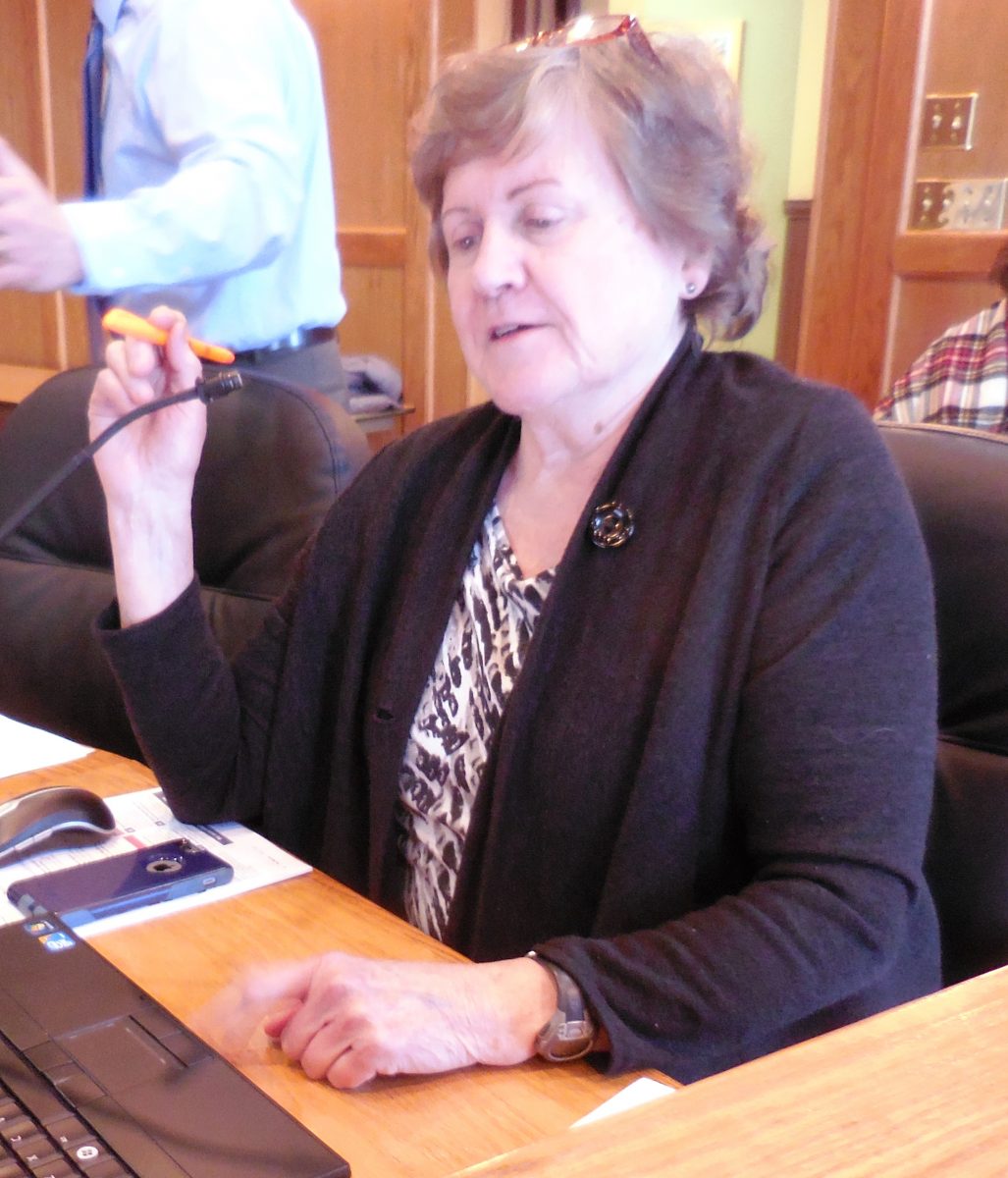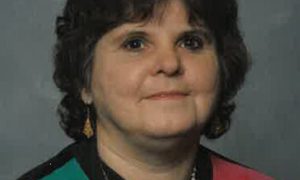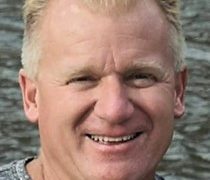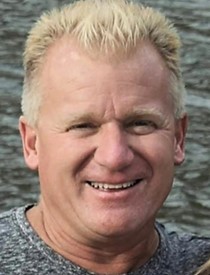WESTFIELD – Following a one-hour debate in a Legislative & Ordinance-led meeting of the whole in City Council Chambers, Councilors Dan Allie, Matthew Emmershy, Dave Flaherty and Andrew K. Surprise effectively killed the $13 million water bond on the first reading during the City Council meeting Thursday.
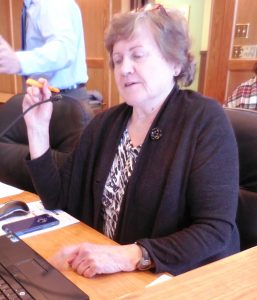
Ward 1 City Councilor Mary Ann Babinski comments during the City Council meeting discussion on the $13M clean water bond (Photo by Amy Porter)
Their vote was to accept the 2-1 negative recommendation of the Finance Committee made by members Emmershy and Surprise, with chair Allie the lone dissenter in committee although he joined them for the City Council vote. Eight counselors voted not to accept the negative recommendation, meaning they supported going forward to a second reading on the bond. Councilor Robert A. Paul, Sr. was absent, and nine votes are required to pass a bond motion.
The $13 million bond was, in part, for two water filtration systems, one for Wells 1 and 2, and one for Wells 7 and 8, all of which serve the north side of town. The bids for the water filtration for 7 and 8 are out and due back by April 3. Mayor Brian P. Sullivan said this week he can’t go forward without the financing in place.
During the discussion in L&O, Ward 1 Councilor Mary Ann Babinski said she has followed the water issues very closely, ever since the first meeting was called in 2016 when Wells 7 and 8, which are in her district, were shut down.
“The point I want to make here is, on the north side, we’re limping along on one well, because three have been shut down and Well 1 isn’t in great shape,” Babinski said. “One of the glitches holding everybody up is whether the Air Force is going to pay for this. One of two things is going to happen here – we may get reimbursement or we may not. Every situation is different. One size doesn’t fit all. Each different community, the Air Force is going to treat them as a different community. I want to have the faith that somewhere down the line that we will,” she added.
“This isn’t a laughing matter. This isn’t something to fool around with. I don’t want a temporary solution. Why wait – it could be a lot more costly down the road. I’m voting for this because I want it to happen now, as soon as possible,” Babinski added, urging the councilors who were unsure to vote for the first reading on the bond, and take the three weeks until the next meeting to get the information they needed to go forward.
“I’ve gone through this every which way. The decision is we’re going to pay for this now. I’m going to vote for this bond,” Babinski concluded.
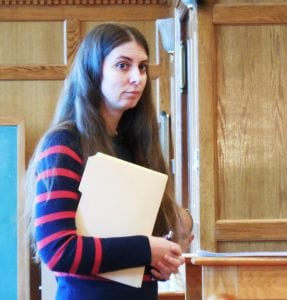
DPW Systems Engineer Heather Miller listens to questions posed by the Westfield City Council during their debate on the $13 million water bond (Photo by Amy Porter)
The temporary solution Babinski referred to is a temporary filtration system that the Department of Public Works is actively pursuing. Department of Public Works Assistant Director Francis Cain and DPW Systems Engineer Heather Miller answered questions at the L&O meeting about the temporary fix and whether it would be sufficient to take care of Well 2 until the Air Force process plays out.
“The problem is it’s a temporary structure. It will be very secure, but there are security issues with a 40,000 pound carbon filtration vessel on a concrete pad as big as this room,” Cain said.
“With a temporary treatment plant, you get a small amount of water from a single well that can be installed in a few months. A treatment plant has multiple filters designed for each well, and requires lead time,” said Miller. “The temporary solutions we’re looking at are a good first measure, but won’t meet our water demands for a typical summer,” she added, noting that Westfield uses on average four million gallons a day in the winter, and nine million gallons a day in the summer.
Mayor Brian P. Sullivan, who had been listening to the debate, then came forward.
“The biggest thing is we have contaminated water. You were elected to make many tough decisions. Having sat in these seats, there were many tough votes. Public health and safety should be your top priority. We have one well on the north side limping along. Once Wells 7 and 8 are online, we have the capacity. We have tons of water; we just don’t have clean water. This shouldn’t be a tough vote. The Water Department took a tough vote to raise the rates,” Sullivan said, adding that the raising of the rates was based on the $13 million bond.
“We’re talking about drinking water, clean water for the citizens. How dirty does the water have to get before we fix it. Now is the chance to do it. The city takes long enough for our process, if we wait for the government… If the city has to pay for it, we pay for it. It will be great to get reimbursed,” said Ward 6 Councilor William Onyski, who also represents residents served by the wells that have been shut down.
Following its defeat in the City Council meeting, Babinski expressed her disappointment. “I’m very disappointed that they wouldn’t give us the luxury of a second vote. They would have had three weeks. I don’t understand why they couldn’t do that. We’ve done it before for things not as important as this,” she said.
When asked what the next steps are, Council President John J. Beltrandi said he didn’t know, it was up to the Mayor. “I have a fear when you’re playing with public health and safety,” he said.
At-large Council Brent B. Bean, II agreed. “They are playing a dangerous game with public safety,” Bean said.
Kristen Mello, citizen activist from WRAFT (Westfield Residents Advocating for Themselves) who was present for both meetings on Thursday, said the vote against the bond was not the end of the story.
“The Mayor and the Council can work together to pressure our federal representatives to get an Environmental Services Agreement with the Department of Defense,” said Mello. She said the agreement would outline who pays for what. “The request has to come from the city and the federal legislators,” she added, naming U.S. Senators Elizabeth Warren, Ed Markey and Congressman Richard Neal.
Mello also suggested asking them to pay for blood testing for residents.

